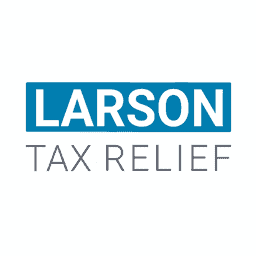Merchants are required to collect sales tax on certain purchases and remit payments to the state. Otherwise, they commit tax evasion, which can come with both civil and criminal penalties. In this guide, you’ll learn more about how sales tax works, who’s required to pay it, potential penalties for tax evasion and how to avoid them.
Best Business Tax Services

Learn how Larson can help you get tax relief for your business with a team of 65 people, including 17 federally licensed IRS Enrolled Agents.

Learn about Anthem Tax Services, a company offering tax debt relief and tax relief services to help people reduce their tax debt.
What is Sales Tax?
In short, it’s a tax that’s assessed by the state when certain goods or services are purchased. Sales tax is expressed as a percentage of the sales price. So, if the sales tax rate in your state is 7 percent and you make a taxable purchase for $28, you’ll pay a total of $29.96.
The consumer must pay the sales tax to the seller, who is then obligated to report it and make a payment for the same amount to the state. These funds are generally used to fund public services, including libraries, parks, fire departments, roads, courts and prisons.
Who is Required to Pay a Sales Tax?
Sellers are required to pay sales tax on goods or services that are sold and are subject to taxation. However, if the item is exempt from sales tax, no tax liability is to be collected, reported or paid to the state.
How Are Sales Taxes Collected and Reported?
As mentioned above, the merchant or retailer collects sales tax at the point of sale. They must also legally report the amount collected and remit payment to the state.
In the event that the seller does not collect sales tax from you, it’s your responsibility as a consumer to ensure it is reported on your state income tax return and paid by the due date.
What are the Penalties for Not Paying Sales Tax?
Wondering what happens to sellers who are found guilty of tax evasion? There are two common outcomes – civil penalties and criminal penalties for failing to pay or failing to file.
Civil Penalties
Civil penalties are triggered when you make every effort to pay sales tax but are unable to meet the filing and payment deadlines.
Most offenders are assessed a monetary penalty for committing sales tax evasion. This amount increases if you owe a substantial amount in back sales tax.
Criminal Penalties
Criminal penalties result from willfully failing to pay what’s owed, preparing a fraudulent return, signing a false document relating to sales-tax-related matters or submitting a fraudulent return.
You could be charged with a misdemeanor for tax evasion. This charge is upgraded to a felony in several states if the amount you owe exceeds $10,000, and you could also face jail time.
How To Avoid Penalties for Not Paying Sales Tax
If you’re facing penalties for not paying sales tax, the tax relief professionals may be able to assist. Their team of licensed tax professionals can help you arrange favorable terms with the state so you can avoid feeling overwhelmed and focus on what you do best.
Their arsenal of state tax relief options includes installment agreements, Offers in Compromise (OIC), corporate shut down, corporate formation or the pursuit of Currently Not Collectible (CNC) status. But with a free consultation, you can discuss your needs with a member of the team to identify a solution that best suits your situation.







